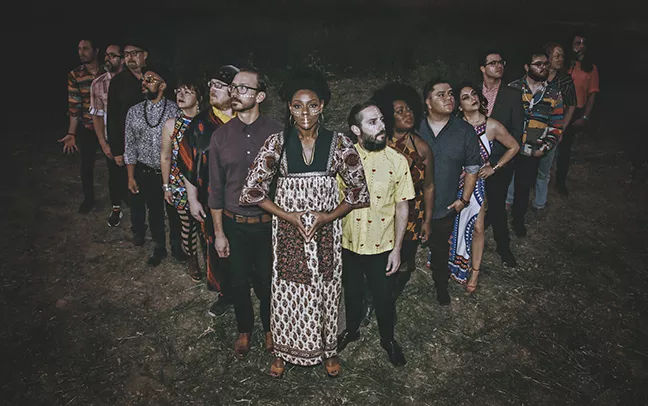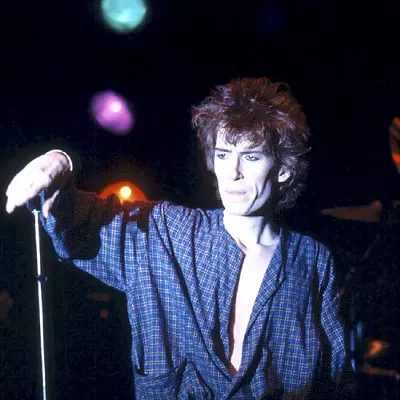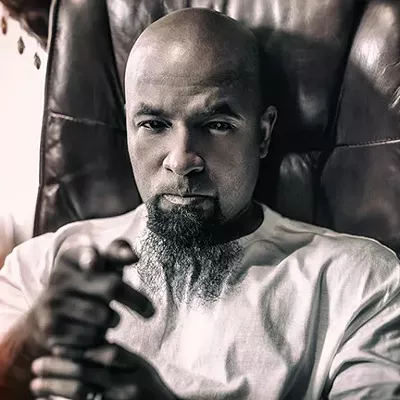The term "afrobeat" first came into common usage in the 1960s thanks to Nigerian bandleader Fela Kuti. A huge James Brown fan as well as a renowned human rights activist, Kuti blended West African musical styles such as fuji (Nigeria) and highlife (Ghana) with American funk and jazz in a way that had never been done before. Music lovers across the continents sat up and took notice.
"Afrobeat is a paella of funk, jazz, tribal African music, lots of percussion, lots of horns," says Aldy Montufar, music director and trumpeter for the Phoenix Afrobeat Orchestra.
Nearly six decades later, the influence of Kuti can still be heard in the music of a number of different bands, including the Phoenix Afrobeat Orchestra here in Arizona. The band was formed in 2010, though it took a couple of years to find its feet.
"There have been some changes over the last few years that have cultivated everything that we do now," says Montufar. "It came about mainly because the guy who started our band is actually our bass player, David Marquez, and it was right around the time of SB 1070, and he was fed up with everything politically with immigration laws and whatnot. That sparked his interest in forming some sort of a project, and Afrobeat lends itself to that kind of political climate. Having a platform to speak against those kinds of things. That's how it came to be."
Since 2010 of course, the world has only gotten more politically fractured. Any anger about anti-immigration policies can only have increased under the current administration. The band has evolved in that time, but Montufar says that the biggest difference is in their level of professionalism.
"I think initially he had a few members that would just kind of jam," he says. "Ultimately, it's gotten a little more serious. We've put out a couple of albums, and gotten more serious about the work that we do, and the message that we want to get in there. Just taking it on a more professional path. We've stepped our game up and are just stroking."
The band really stepped it up in 2014 when singer Camille Sledge joined the band, daughter of Sister Sledge co-founder Debbie Sledge. It was in New York in 2005 that Sledge was exposed to the music of Kuti, before moving to Phoenix in 2012. A stunning performer, she's added a bit of something new to the group's culturally and musically diverse lineup.
"Most of us are locals in Arizona but we all have different backgrounds, coming from different states, different musical backgrounds as well—it kind of makes who we are," says Montufar.
The group includes somewhere between 14-16 musicians, depending on the night that you catch them. Most of those artists are working musicians, performing and recording with other projects as well. Meanwhile, the Phoenix Afrobeat Orchestra has two albums available: the PAO! debut, and the sophomore Laugh To Keep From Crying which came out about a year ago. Montufar says that the band grew a lot between records.
"I think we grew into our own in how to produce our own music," he says. "On our first record, a lot of the songs just came to be by group jamming and creating stuff. The second album has more of a refined sound. A little bit more concentrating on composing music, as opposed to spontaneous jams. It was a little bit more thought out, and we had some writers who stepped more into the writing role of the band as opposed to a community type thing. Everybody puts their input in, and we all try to figure it out together. They were more composed independently and then brought to the band, in some cases. I feel like each song has its own way that it comes about as well. So there's not really one method to everything."
Montufar says that the highlight of the PAO career thus far has been the ability to release music that conveys their message.
"We've had some incredible shows, and we've played some great festivals that are community based and local," he says. "We've travelled just a little bit out of Arizona, and that's been awesome to be able to go to different venues and have people that have heard of us show up, and show up to see us as opposed to just randomly being there. Being able to match up with national acts and play alongside some amazing groups that we look up to. Those have been some great moments."
The band enjoys making the short commute here to Tucson, not least because Montufar used to live here. This will be their fifth Tucson visit.
"We've been able to play a lot of different venues down there," Montufar says. "I lived in Tucson for a while, so for me personally it's always great to go back and play. I used to play in Tucson a lot when I was younger. Tucson is an awesome place, especially for the arts and the music culture. I miss that whole aspect of a central location of arts as opposed to Phoenix where there's just as much but it's more spread out. Tucson has a downtown scene that's super hip and really cool."
They'll be performing at the Agave Heritage Festival, which Montufar admits to knowing very little about.
"It's at Club Congress, and this is gonna be our third time playing that specific venue," he says. "We've played inside but this is gonna be an outdoor festival. Because we're such a large band, we love doing the outdoor stuff. It just feels a lot more like open air and there's usually more room for the crowd to dance. We're all about that moving and shaking. We're really looking forward to it."
It looks all set to be a great time. The band has some new material to pull out at the festival, likely to appear on the next album.
"We played a show a couple of nights ago and that's the first time we played some of those out," Montufar says. "We'll have some new music rolling out, and a lot of the typical stuff: the big horns, the big dancing, our lead singer is a phenomenal performer to watch and experience, so you can expect that we'll try to bring the party."








